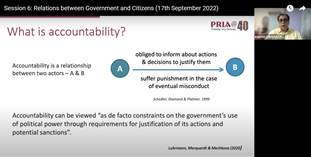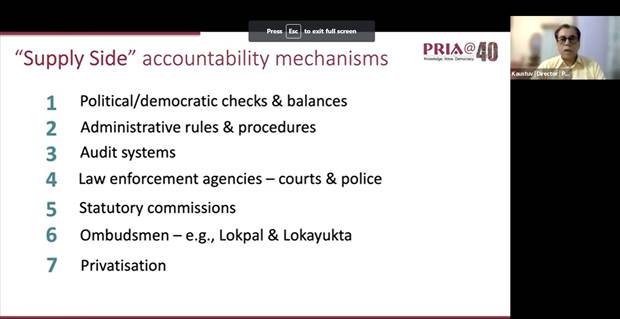This week's session titled, ‘Relations between Government and Citizens’ was the first session facilitated as part of the Social Accountability module. The session aimed to inform fellows about the types and benefits of social accountability, and rights associated with social accountability. It was facilitated by Dr. Kaustuv Kanti Bandyopadhyay, Director at PRIA, Head of PRIA International Academy (PIA) – the academic vertical of PRIA, and leading expert on citizen participation and social accountability in the urban space.
The session started with helping fellows demystify the meaning of state and government relationship and state and citizen relationship. After this, the fellows were asked to share one example of their interaction with government institutions or a public institution such as a school, college, or hospital in which they were either highly satisfied or disappointed with the service or interaction. Some pointed towards how a particular issue e.g., flooding in their city or when they wanted to secure some identity certificates, was dealt with differently by different leadership in same organization. While others stated how in their cities and towns, government health services were being delivered efficiently. Additionally, services during COVID-19 were also discussed. One of the fellows shared how due to some technical glitches in the COWIN app, she has been receiving information about the vaccination certificates and other updates for other people, which is unethical in various levels.
The stories shared by the fellows helped develop a collective understanding of how some institutions provide services and procedures that are operational and working, and how certain institutions or certain individuals are not responding the way they should. One of the reasons for the same could be accountability.
Later through a presentation, fellows understood the meaning of accountability and how it functions. Accountability involves two critical aspects - answerability (that an institution is answerable to people who have given the power to decide on behalf of them) and enforcement (if an institution is not answerable or accountable). Accountability involves the obligations of public officials who can be held accountable for their conduct and performance, as well as the rights of citizens. The sub-types of accountabilities, including the relationship between government, citizens, media and civil society, and other oversight bodies, were discussed in detail.

The fellows were then divided into groups to discuss the possibilities for bringing accountability among the oversight institutions, media, and civil society (group 1) and government, citizens, and media and civil society (group 2). After a brief discussion amongst themselves, they shared with the group.

The activity was followed by a debrief. The fellows were informed about how accountability is a very efficient tool to promote active participation and responsible citizenship. Apart from the legal framework, several other citizen-driven initiatives can be used for self-regulation and for imposing self-accountability.